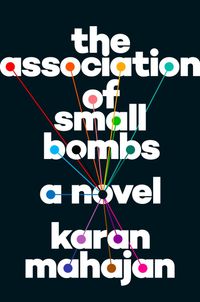The Association Of Small Bombs Quotes

"In a great city, what happens in one part never perplexes the other parts."
"You wrap your hand around an armrest on a bus and it is as if the burning steel was riven from the earth only to remind you of the hotness at the core, to which your children will be returned."
"Most startling of all, for the survivors and rescue workers both, was the realization that the main dusty square was rooted so firmly by half a dozen massive trees."
"For a month afterwards, they made do without the TV."
"A journey to Delhi to plant a bomb did not require much, at least in the way of equipment."
"You destroy a city with the material it conveniently provides."
"Delhi—flat, burning, mixed-up, smashed together from pieces of tin and tarpaulin, spreading on the arid plains of the North—offered no respite from itself."
"The landscape, a wild scrawl of reddish terraces and gushing private rivers, came right up to the bus, nearly shattering it."
"Delhi is a Muslim city, with a Muslim history and Muslim monuments."
"If you want to be a hero you have to be a martyr."
"The only way to endure solitary confinement—if that was your sentence—was to retreat into your own memories, to open and reread the books stocked in the library of your mind."
"Their personalities did not add up to a bomb."
"The important thing is that they’ve been caught."
"There is nothing to be gained from being involved in the legal system, believe me."
"Humans, especially bourgeois humans, were not meant to handle this kind of stress."
"When things are good, you can see no other way of living; when things are in ruins, there appear a million solutions for how this fate could have been avoided."
"For every India, a Pakistan of possibilities."
"The poorer you are, the closer you are to machines in all their nakedness and grit."
"Humans are defined much more by their association with death than by what they do in life."
"Pain is supposed to heal. When an injury doesn’t go away it’s because a deep-seated psychological pattern had been established."
"You’re sensitive to the pain of others but not so much to your own pain, isn’t it?"
"It was only when I started praying and not thinking of myself that it went away."
"I too was skeptical when I was first told about this idea. We’re slaves of science. We can’t believe there can be an answer outside doctors."
"In America, you see, you die twice—once when you grow old, and once when you actually die."
"But prayer keeps you focused on the eternal present."
"If you had horrible thoughts, if you carried rage against your parents and sexual fury against women in your head, how could you be healthy, happy?"
"It was a place you could waste your whole life without thinking once about others—until you too were put away and replaced by the young."
"I’ve embodied these problems. I came from a background without God."
"Like all other tragedies, it had been covered up; the market had gone into a huddle of concrete and commerce around the blast, paving over the scars like a jungle coming back over a burnt field."
"Almost zero—but stranger things have happened."
"Hold your nerve, he told himself. Believe in God."
"There is an unnatural concentration that comes with being freed of pain after years."
"It’s better for the event to be big, to affect many."
"The fewer that die, the lonelier the victims are."
"It’s a world where everything operates by force."
"Being back home, or in the vicinity of home, set his nerves tingling."
"You’re the friend of my son and that’s the most important thing."
"Sometimes, in his darker moods, Sharif felt there had been no great figure in this country ever."
"An odd calm overcame him—the calm of living in cinematic time."
"With the evening had come an iota of relief and cool and he didn’t even mind the traffic."
"The auto dropped him off at the mouth of the bazaar—near the square where the pukka market was based."
"Better to have lower- than upper-extremity injuries."
"He was only happy when he was leaving his house, shedding the yoke of this new life that had been thrust upon him."
"I want Anusha to grow up free of all pollutants."
"He was making an encyclopedic film about Delhi."
"The deadliness of an attack should not be measured by its size."
"But the boys had ruined their lives. The boys, not the bomb, had been their killers."